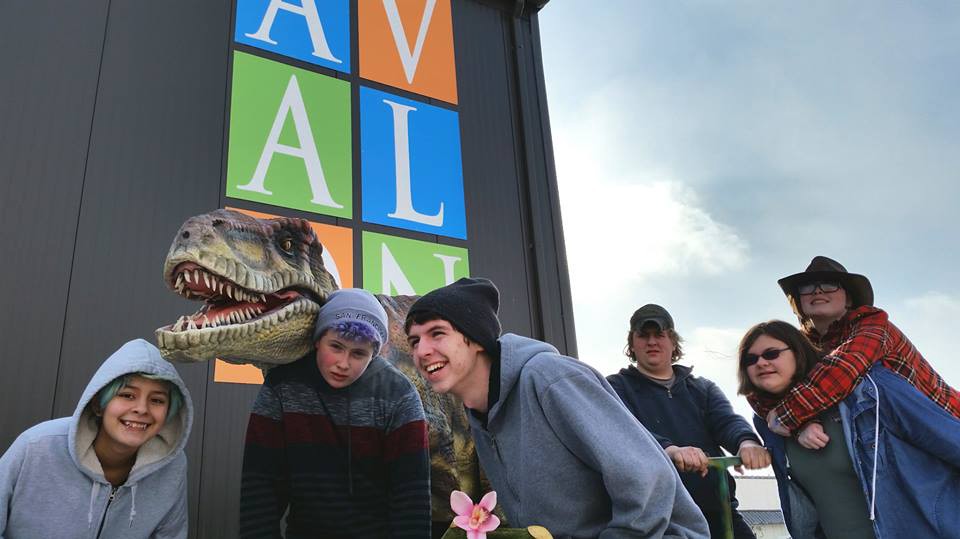At Avalon, the focus is on how students learn, as much as what they learn
By Derek Jensen
Coordinator at XQ School PSI High in Seminole County Public Schools
Walking into Avalon Charter School in St. Paul, Minn., on a snowy winter morning is like stepping out of a black-and-white film and into the Technicolor world of the “Wizard of Oz.” The campus is bright and full of life. Student work is everywhere. Glass classroom walls are portals into little worlds of creativity. Stepping into Avalon for the first time immediately gives you a feeling that this school is different.
Where Students Completely Own Their Learning
I first heard about Avalon in Monica Martinez’ book, “Deeper Learning.” As someone working to redesign high school in Sanford, Fla., I was deeply curious about a school where students completely own their learning, creating all of their own projects and assessments. I was inspired by Avalon as a truly democratic place where students have a voice and teachers collaboratively operate the school without any administrators.
In many ways, Avalon feels like a school that shouldn’t work. As educators, we want students to take control of their pathway through school, but then we become frustrated over their lack of initiative or the rate of their progress. Many times, that dynamic pushes us back into tired old habits. We complain that we could be innovative if the students would just comply. Avalon completely rejects the old ways of doing school and embraces the messy, personalized journey that each student must take towards graduation. Avalon educators realize that learning ebbs and flows, and that helping students become lifelong learners is just as important as any particular content.

A Well-Designed Roadmap
That student journey is what drew me to Avalon. My school, PSI High, is an entrepreneurial high school where students can choose their project topics and trajectories. As Avalon students led me around for the day, I discovered that Avalon’s commitment to empowering their learners involves:
1) Incredible competency-based systems to put students in the driver’s seat.
2) A project process deeply ingrained into the fabric of the school and the minds of students.
It may seem obvious, but students need a well-designed roadmap if they’re going to drive their learning. Over the last 20 years, Avalon has constructed an incredible system of learning goals and competencies mapped to credit and graduation. When students log into their learning and project management system, called HEADRUSH, they have access to a dashboard of these learning goals and where they need to demonstrate mastery.
As students construct projects, select seminar-style courses, and plan place-based learning experiences, they map these learning goals into their work online. Advisors help students with this process seamlessly online until a project is approved. That’s when the work begins.
An Enthusiasm for Learning
While I was roaming campus, a young man leaned out of his class door and asked if he could share his project with me. I happily obliged. He directed me to sit in a decadent office chair, like something out of a spaceship. After sitting for a minute, I asked when I could see his project. I was surprised when he said that I was sitting in it!
He explained that he loves Tesla cars, and thinks that their elegant design could extend beyond the automotive space. Taking slightly defective or damaged components from the cars, he was transforming them into works of furniture art. Not only that, he was learning about the electronic systems so he can replicate features like seat warming. Not only was I captivated by the project, I was even more impressed with this student’s enthusiasm for learning as he showcased his work and told me what course credit he was earning by doing it.
“So What Are You Going to Do Next?”
I believe that students can take control of their learning and do really cool projects when they truly understand how to do a project. Posted clearly in the hallways and hearts of every Avalon learner is an incredible common language and process around projects. And it’s obvious that they’ve practiced a lot.

When I found a laughing, energetic group of students sitting on the hallway floor, they quickly invited me to sit with them. They explained that they previously conducted a sleep deprivation study, showing me their project plan and collaborative workspace featuring graphs of their data. I asked, “So what do are you doing next?” They enthusiastically replied that they want to expand the study, then get their math teacher to help them better analyze the data. They opened a document with the plans tightly laid out and spoke in great detail about the ways in which they’ve improved their methodology. Their excitement was contagious.
Talking to students around Avalon, they speak fluently about the parts of their project like a second language. They craft driving questions, articulate learning goals, evaluate their purpose, and constantly revise.
Completely Personalized and Passion-Based
As I prepared to leave Avalon for the day, the deliberateness of this entire system resonated with me. Students at this school didn’t accidentally discover how to design a project and coordinate all of the resources they need to do it. Their advisors have spent many years carefully revising the project process. Both teachers and student leaders spend significant time coaching new students during their first small projects. The systems and process are the unifying forces in a school where everything is completely personalized and passion-based.
My big takeaway from a day at Avalon: the teachers and students value how to learn more than what to learn. If we can empower our learners in the same way, I know they will be successful no matter what they pursue.
TAGS:



 Tweet
Tweet 



